To Master and Apply Words in Practice
新航标职业英语·综合英语预备级·学生用书Unit 4
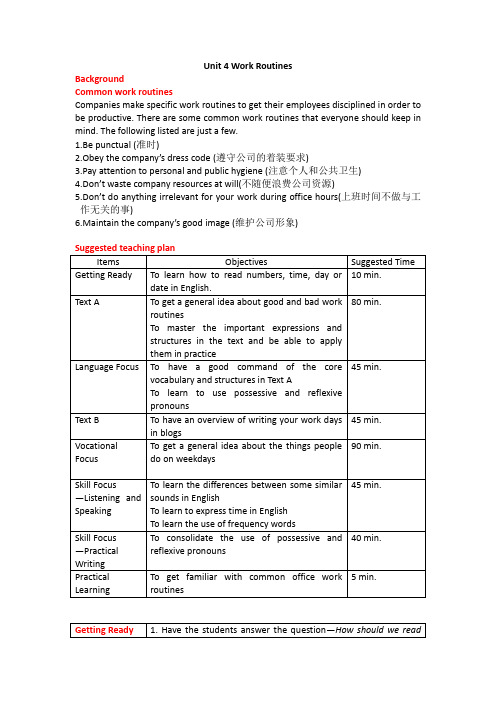
80 min.
Language Focus
To have a good command of the core vocabulary and structures in Text A
To learnto usepossessiveand reflexive pronouns
45 min.
Text B
3. Havethestudents checktheiranswersandgive some explanation about thereadingof numbers, time, day or date.(4 min.)
Listening Scripts of Getting Ready
1. Tina goes to work by train, and she usually catches the 7:15 train.
【拓展】routinea.常规的,日常的;平常的
Themistake was discoveredduringaroutinecheck.这个错误是在一次常规检查中发现的。
The operator has to be able to carry outroutinemaintenance of the machine.操作员必须能对机器进行日常维护。
To have an overview ofwriting your work days in blogs
《全新版大学进阶英语综合教程3》unit3教案
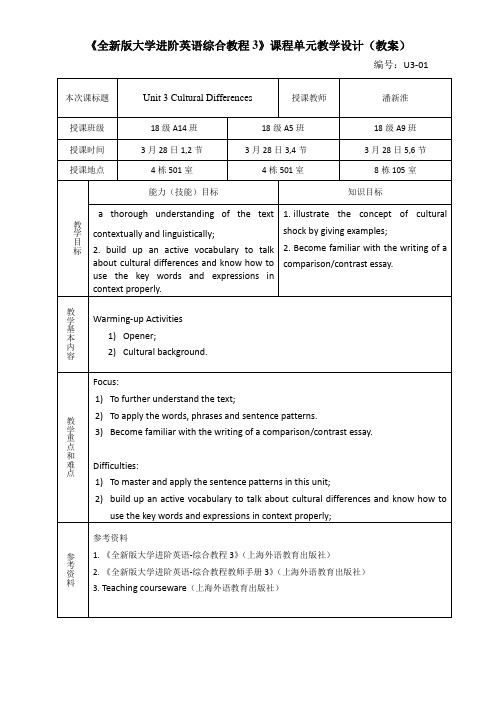
《全新版大学进阶英语综合教程3》课程单元教学设计(教案)编号:U3-01Steps(步骤)教学组织Step One(步骤一)Opener:Pair work: The pictures below compare Westerners (marked in blue) andChinese (marked in pink) in their way of looking at children and the family,travelling, and the role of the boss in an organization. Look at the picturesand work with your partner to answer the questions that follow.Helpful Expressions接送孩子drop off and pick up the child风土人情local customs and culture到此一游been here, done that高高在上superiority有权有势powerfulQuestions:1 In what way does the role of grandparents in Chinese families differ fromthat in Western families2 In what way do Western tourists and Chinese tourists behave differently3 In what way do Western and Chinese employees differ in the way they lookupon their bossTips in this part:1. Introduce the topic to the class by asking if they can give any example ofhow Chinese and non-Chinese behave or think differently in life.2. Explain the pictures in Opener that illustrate the differences between theWesterners and Chinese in their perspective on different issues.3. Ask Ss to look at the pictures and discuss the differences in pairs with theaid of the questions that follow.4. To sum up, have different pairs report to the class their discussion on thepictures, one pair for one picture.Step Two(步骤二)Video watching:After watching a video clip about an interview with three foreign womenmarrying Chinese husbands, discuss the following questions with yourpartner.1. According to the video, when raising grandchildren, what is the difference《全新版大学进阶英语综合教程3》课程单元教学设计(教案)编号:U3-02《全新版大学进阶英语综合教程3》课程单元教学设计(教案)编号:U3-03《新视野大学英语(第三版)》Book 3课程单元教学设计(教案)编号:U3-04DiscussionDiscuss what you like / dislike about where you live.things you like:a food market; a bookstore; close to the metro; a good hospital / medical care centerthings that are nice but not essentiala good local supermarket; a sports center;a theater / cinema; a barthings you dislike:lacking of parking space; various types of noise; pollution; high crime rateThink about your neighborhood. What would make it:saferLectures should be given to tell people how to prevent fire, theft and other dangers. Besides, the police should make sure the streets are safe –not only from crime but also from traffic accidents.more beautifulI think we should plant more trees and flowers in the community. In addition, we should discipline our own behavior and should not litter garbage everywhere or draw on the buildings.more interestingMore entertainment activities should be held to draw the interest of people. Meanwhile, don’t forget the children. We should also provide them with facilities to give them fun and joy.better for your healthI think we should build a community gym providing a variety of affordable exercise options. Besides, activities should be conducted to help people quit smoking or excessive drinking.more of a communityI’d really like to see a good shopping mall, where people can meet, get to know each other and entertain themselves.。
英语翻译UNIT 2 -词类的转换
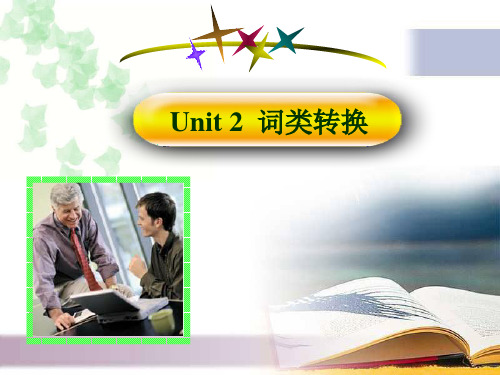
动词转为介词或介词词组
1. 这是违背大多数人民的意志和时代潮流的。 This is against the will of the majority of the people and against the trend of the times. 2. 那么怎么办呢?孩子们都上一个学堂。 Well, what is to be done? The children are in the same school.
5. 她的表演给观众的印象很深。 Her performance impressed the audience deeply. 6. 他不顾一切困难坚守岗位。 He stood fast at his post despite all difficulties.
7. 他在讲话中特别强调提高产品质量。 In his speech he laid special stress on raising the quality of the products. 8. 他可晓得他儿子的行为表现吗? Is he aware how his son has been behaving? 9. 辛亥革命的目的在于推翻满清王朝。 The Revolution of 1911 aimed at overthrowing the Qing Dynasty.
要充分重视自然科学理论包括现代数学、高能物理、分子 生物学等基础理论的研究,忽视这一点就不能掌握和运用 世界上先进的科学技术成果,不能很好地解决我们建设中 遇到的重大问题。 Full attention must be paid to theoretical research in the natural sciences, including such basic subjects as modern mathematics, high energy physics and molecular biology. Negligence in this respect will make it impossible for us to master and apply the results of advanced world science and technology and properly solve important problems in our construction.
人教版必修第一册Unit2TravellingAround复习课(习题课)教案
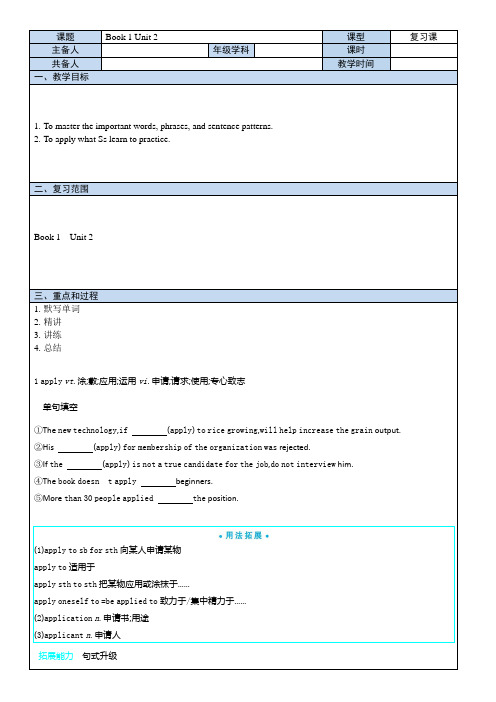
课题Book 1 Unit 2 课型复习课主备人年级学科课时共备人教学时间一、教学目标1.To master the important words, phrases, and sentence patterns.2.To apply what Ss learn to practice.二、复习范围Book 1 Unit 2三、重点和过程1.默写单词2.精讲3.讲练4.总结1apply vt.涂;敷;应用;运用vi.申请;请求;使用;专心致志单句填空①The new technology,if(apply)to rice growing,will help increase the grain output.②His (apply)for membership of the organization was rejected.③If the(apply)is not a true candidate for the job,do not interview him.④The book doesn t apply beginners.⑤More than30people applied the position.(1)apply to sb for sth向某人申请某物apply to适用于apply sth to sth把某物应用或涂抹于……apply oneself to=be applied to致力于/集中精力于……(2)application n.申请书;用途(3)applicant n.申请人拓展能力句式升级If you apply yourself to the job in hand,you ll soon finish it.⑥,you ll soon finish it.(现在分词短语作状语)⑦,you ll soon finish it.(过去分词短语作状语)2amazing adj.令人吃惊的单句填空①To my(amaze),he comes from America but cannot speak English.②Visitors were amazed the achievements in the car manufacture of the city during the past decade.③In the Olympic Games,Usain Bolt ran with(amaze)speed and won the first place.(1)amaze vt.使惊讶(2)amazed adj.吃惊的be amazed at/by对……感到吃惊(3)amazement n.惊奇to one s amazement令某人吃惊的是in amazement惊愕地一句多译让他感到吃惊的是,他惊人的成就没有使我们大为惊讶。
新视野大学英语读写3(第三版)优秀教案

新视野大学英语读写教程(第三版)BOOK 3 教案章节Unit One: The Way to SuccessSection A: New Words and Expressions教案内容Text: Never, ever give up!Exercises: Vocabulary, Sentence Structure,Translation Listening, Speaking & Writing Skills教案目的1.To talk about the secret of success。
2. To further understand the text。
3.To apply the phrases and patterns。
4.To master the essay writing skill。
1. Clearly know the structure of the passage。
2. Master the important language points。
教案要求3.Briefly summarize the passage alone。
4.Correctly use and master the key words in this unit.重点难点1.The structure of the whole passagediscussed and the writing waysmentioned in this passage2.The reading skills mentioned in this unit3.listening practicing related to the contents learned in this unit1.The use of the new words and phrases in this passage2.The writing ways mentioned in this passage3.Some important sentence structures课堂设计Step 1: Lead-in10m Questioning&The Discussing Questioning&First Step 2: Pre-reading Activities10m DiscussingTwoLecturing,PeriodsStep 3: New Words80m Questioning&Giving Examples The Step 1: Background Information10m Questioning& Second DiscussingTwo Step 2: Structure Analysis10m LecturingPeriodsLecturing, Step 3: Language points and Difficult70m Questioning&SentencesGiving ExamplesStep 4: Comprehension of the Text A10m Questioning&DiscussingStep 1: Summarize the passage orally20m Questioning& DiscussingTheStep 2:Exercises (Words in use, WordThird Questioning& building,Banked cloze, Expressions in use,70mTwoTranslation in Section A)DiscussingPeriodsLecturing, Step 3: Revision & Homework10m QuestioningStep 1: Check Homework30m QuestioningTheStep 2:Structured Writing30m Watching &Forth DiscussingTwoStep 3: Listening20m Listening &Periods QuestioningStep 4: Speaking20m Questioning & Discussing教学过程The First Two Periods:Step 1: Lead-in:1.What is success?2.What do you think are the secrets of success?Step 2: Pre-reading Activities:1. Listen to a talk about steps to make your dreams come true. Fill in the blanksbased on what you hear.2. Listen to the talk again and discuss the following questions.Step 3: New WordsThe Second Two Periods:Step 1: Background Information1. Public schools in the UK & US2. Winston ChurchillStep 2: Structure AnalysisPart I (Paras.1-2): By using Winston Churchill’ s story and his speech at Harrow as anintroduction to the topic, the text makes clear its statement: thesecret of success is“ Never give up”.Part II (Paras.3-7): Through the examples of world famous scientists, statesman, andjurist, the text brings forward the statement that only those with astrong will , those who“ keep their eyes on the prize” , and those whoexpend the substantial effort to keep going, will finally succeed.Part III (Paras 8): By reinforcing the statement given in part II, the text draws theconclusion that with hard work, determination, dedication andpreparation, you can transcend any handicap, accomplish any feat,and achieve success.Step 3: Language points and Difficult SentencesPractical Phrases1. deviate from ⋯偏离,背离⋯⋯2. preclude sb. from doing阻止某⋯人做⋯⋯3. triumph over战胜⋯⋯⋯4. in (the) pursuit of追⋯求⋯⋯5. work one’ s 。
新视野大学英语第三版第二册第一单元sectionB
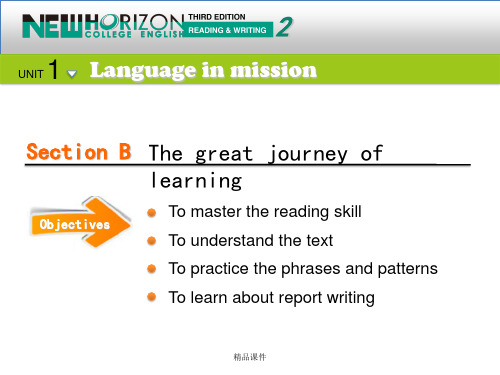
精品课件
Section B The great journey of learning
Text study
Text comprehension Language focus Critical thinking
2. What do many English learners want to do? What is your idea about it?
Tips
Many English learners want to use all the difficult words they know. They can understand many difficult English words when reading or listening, but they don’t use most of them when speaking or writing in English. But from my point of view, we should make sure of our deficiencies, and then improve our language skill by more practice. Repetition will help move you from basic literacy toward true proficiency.
精品课件
3. What motivated Malcolm X to launch on a quest to overcome his language deficiencies? (Para. 4)
科创学院成长英语一教案新部编本unit1(1)
教师学科教课设计[ 20–20学年度第__学期]任教课科: _____________任教年级: _____________任教老师: _____________xx市实验学校重庆科创职业学院讲课方案(教课设计)课名:成长英语(一)教师:李婷婷班级:软件外包服务ZK1301编写时间:2013 年9月11日课题:Unit 1 A New Life, A New Beginning教课目标及要求:1.To learn to talk about greeting people and introduction on campus;2.Listen and learn more about college registration procedures;3.To master the useful expressions about greeting and introduction.教课要点:To master the useful sentences in the conversations and train students the listening andspeaking abilities.教课难点:How to greet people and make introduction on campus in English.教课环节及组织:旁批栏:Part I. Lead-inGoing to college has been a dream for most high school students. Beforeentering college, have you ever asked the following questions: Why did youdecide to go to college? What kind of life will it be like in college? What kindof person will you share the same room with? What kind of activities will it belike in college?Part II. Speaking Practice1. Warm-up activity:Questions: What are these friends saying? Ss should complete the sentenceson P.2 and T presents the keys on PPT .2.Study the useful sentences in the speaking (T explains the keys on PPT)1) Excuse me, could you tell me the way to the registration office?2) I m’majoring in Business English.3) How are you doing?4) May I have your name?5) Could you tell me the way to the registration office?3. Listen to Dialogue 1.Students listen to the conversation and try to read it in pairs. Then some Ss read旁批栏:it in pairs. T introduces the etiquette in greeting on PPT. (with smiles on faces;shake hands when first greeting;)4. Perform the activity in pairs.Students read Dialogue 2, discuss in groups and perform it. Then T asks somegroups to perform before the class. Other students give comments and evaluatethe results.Part III. Listening Practice1. Study the New words.students preview the new words on PPT and try to know the meaning, thenread them loudly.2.Listen to Dialogue 1 and fill in the table with information from the dialogue.Dialogue on PPT)3.Check the result and evaluate the students listening ability.4.Learn the useful sentences for the listening.(T presents the useful sentences andexplains them).(1) May I change the major?(2) Have you declared your major?(3) Please fill out the application form over there.(4) I ’m sure I will live a colorful life with my dear friends.5.Listen to Dialogues 2 and finish related tasks. Students listen to the dialoguetwice and finish the tasks. T checks the result and evaluates Students listeningability, then explains the key sentences when necessary.Part IV . Summary for Listening and Speakingeful sentences for introduction and greeting on campus; (on PPT)2.Eetiquette in conversations in English.Part IV . Assignments1.Students read Dialogue 3 in pairs out of class and prepare to act in pairs orgroups in class.2.Students finish activities 1-2 on p.4 in groups, T will check the results.重庆科创职业学院讲课方案(教课设计)课名:成长英语(二)教师:李婷婷班级:软件外包服务ZK1301编写时间:2013年9月11 日课题:Unit 1 A New Life, A New BeginningText A My First Year Life in College教课目标及要求:1.To learn Text A and get the main idea of college experiences.2.To master some key words and phrases in the text and train reading ability.教课要点:The comprehensive understanding of the passage; The improvement of reading ability.教课难点:How to use the key words and important sentences in the text教课环节及组织:Part I. Revision.旁批栏:T checks the speaking and listening abilities of students by their performancein groups.Part II. Warm-up activity.Students play with words on p.7 and finish the questionnaire, T will interviewthe students and report the findings in class. Or students can interview theothers and some Ss report the findings.Part III. Comprehensive understanding of thePassage 1. Fast readingSs skim the passage in 5 minutes and get the main idea. T checksthe Ss reading ability by checking the task on p. 9 and evaluates thereading ability. Corrects keys on PPT.2 Study the key words in the textT leads the the students to read the key words in the text and correct the mistaken pronunciation for them. Then T explains the important and difficultwords for the students.(Key words: assume, reveal, enhance,competence,curiosity,)3. Listen and read the passageSs listen to the passage once and pay attention to the pronunciation andintonation, try to read it loudly and fluently. T asks some student to read thepassage one paragraph by one and explains the language points.旁批栏:Part IV . Language points1.(Para. 1) Many high school graduates wrongly assume that college life isfree from worry.Analysis:本句中含有assume 指引的宾语从句“ thatcollege lif e is freefrom worry” , to be free from意思是“ not containing or affected bysomething harmful or unpleasant 。
中职英语(高教版)教案:Carrying forward craftsmanship(全6课时)
Activity1. Listenand match.
Ask students to scan activities to underline the key words, and predict the content of the dialogue. Then play the listening materials.
Sspredict the
Listeningand
check the
prediction.
Activity 5:Act and practice
1.Teachers create dialogue situations through pictures, and briefly introduce the dialogue background. One is talking about teamwork, and the other is introducing role model Hu Shuangquan.
难点
How to improve the Ss’ abilities of listening and Speaking.
教法
Task—basedTeaching Method. Situational learning.
教学设备
Multi-media .CD
教学
环节
教学活动内容及组织过程
个案补充
教
Sara: Did you meet some troublesome difficulties?
面试道路与桥梁工程技术自我介绍
英文回答:Distinguished leaders, I am XXX。
Thank you for giving me an interview。
I have a wealth of practical experience and expertise in the technical field of road and bridge engineering, and I hope to be able to demonstrate my capabilities here。
I graduated from a well—known university in the field of roadand bridge engineering and have shown a great deal of interest in this field since the university era and invested a great deal of time and energy in learning and exploring。
While in school, I have been actively involved in the practical operation and design of several road and bridge projects, building on a wealth of practical experience and professional skills。
After graduation, I joined a well—known engineeringpany to design,construct and supervise multiple road and bridge works。
In these projects, I have continuously upgraded my professional and project management capacity, with notable achievements and reputations。
全国高师技能大赛PPT课件
-
19
Reflection
to arouse the enthusiasm take the role of scaffolding interactive activities
-
20
Homework
reviewing and writing
write a composition of 120 words on the topic “my favorite respectful person”
par1beatrixpotterpar2beatrixsearlylifeherwritingpar3beatrixscontributionsconservationistpar4invaluablelegacybeatrixpotterskimming15爱好者unspoiled卓越的governess未损坏的legacy遗产companion女家庭教师amateur同伴remarkableguessinggame16listeningpracticebeatrixhomeschooledgovernesseswhileherbrothersentawayeducatedsheoftenalonemadeherdevelopstrongattachmentanimals
同伴
unspoiled governess legacy companion amateur - remarkable 15
Listening practice
Beatrix was home (schooled) by governesses
while her brother was sent away to be educated.
Unit 1
People
- 1、下载文档前请自行甄别文档内容的完整性,平台不提供额外的编辑、内容补充、找答案等附加服务。
- 2、"仅部分预览"的文档,不可在线预览部分如存在完整性等问题,可反馈申请退款(可完整预览的文档不适用该条件!)。
- 3、如文档侵犯您的权益,请联系客服反馈,我们会尽快为您处理(人工客服工作时间:9:00-18:30)。
题目:让学生在实际中使用词汇项目设计者吴燕姬Title:To Master and Apply Words inPracticeWu YanjiAcknowledgmentIn writing this project design I have benefited from my supervisors Mr. Huang Weiliang and Mr. Guo Jianlong, with whose patience and timely help, my project design started and proceeded smoothly. I must show my great thankfulness to them.Secondly, I must thank my colleagues Ma Y uhu and Zhou Mingna for their encouragement and discussions with me, without whom the project would not have been finished.Great thanks should also go to my lovely students for their warmly-hearted support and active participation in the project implementation.Contents PageAbstract (5)Introduction (6)Problem and problem analysis (7)Possible solutions (10)Project objective (10)Project hypothesis (10)Project rationale (10)Subject description (11)Research Design (12)Project implementation (14)Project evaluation (19)Techniques for data collection (19)Data analysis (20)Conclusion (22)References (23)Appendix (24)内容提要主要观点和内容:本文主要针对现在高中英语教学中单词的重要性, 同时学生普遍单词记不牢和不会使用, 影响了表达和写作等问题, 以及在词汇教学方面比较传统化,多采取操练和跟说的形式。
而这种简单的重复不能保证单词的掌握和应用。
要掌握单词和应用, 就要让单词活起来。
有鉴于此,提出假设:如果教师能设计形式多样,综合性强的活动,让单词活起来,使学生真正掌握单词并用在实际中,从而提高英语的表达和综合能力。
研究方法:在这次课堂行为研究里,我使用了分析法、原因分析法、头脑风暴法、问卷调查法等来帮助开展,并设计了一些具体的教学活动,如:辨认,挑选,完成句子,单词游戏等。
在实施的过程中学生掌握单词的能力有所提高,能较好地表达自己的意见。
大部分人能记住所学的单词,综合能力有所提高。
这个研究将会持续下去以进一步提高学生的运用能力。
关键词:掌握单词、表达能力、综合能力、应用能力。
AbstractIt is a project report to solve the problem that most of senior middle school students have difficulty in remembering new words, or they forget the words soon after they have learned them from the text book. They just simply remember the meanings of the words. Needless to say, they can’t use the words either, nor can they express themselves freely. What’s more, teachers would typically take the form of repetition or drills in teaching new words. This simply-repeated activity is no guarantee that they will master words. It is difficult for the students to change the short-term memory into permanent memory. In order to ensure long-term recall, words need to be “put to work”. They need to be placed in working memory.It is hypothesized that I can design many different kinds of tasks so that I can help the students to commit words to their memory. They are able to express themselves better and improve their integrating skills.Effective ways are most important in my attempt, including the analytic method, cause analysis, brainstorming, questionnaires and a series of activities, e.g. identifying, selecting, matching, etc. The result proves that the ways I designed is effective for mastering words.Key words: mastering words expressing skills integrating skills applying skillsIntroductionI’m now teaching Senior Grade One students in a middle school. After one semester, I found that my students’ vocabulary was so limited. Every time when I dictated new words, the result was disappointing. I know that even the best students forget words. So more important, perhaps as a remedy against forgetting, is recycling. The research shows that spaced review of learned material can reduce the rate of forgetting. But it’s not enough simply to repeat words. The better way is to recycle them in different ways, and at successive levels of depth.Based on some approaches that I have learned from “English Language Teaching Methodology and considering the characteristics of my students, I decided to adopt a way of recycling and integration activities to help my students with words-learning.Problem and problem analysisProblemThe problem I have is that most of my students can’t commit words to the memory firmly. They forget them very soon.Problem analysisIn my teaching, the problem identified was really a serious problem. There were three main reasons.Firstly, the lesson plan I designed were poor and not interesting. I can’t give the help to my students in time when they have difficulty. I didn’t pay enough attention to these, which made my students lost their interest and confidence. Secondly, some students are too lazy to memorize the new words. So they are weak in English. Thirdly, there are 60 students in my class. This kind of size may have some negative effect. The classroom is too noisy and difficult to manage.The problem had been troubling me for a long time and now I was determined to find a solution to the problem. In my study, I used four methods of analysis.Analytic methodSome of my students can memorize new words, but some of my students can’t. This made me think of these:(1)Why some can’t memorize, while others can?(2)Who are the some that can’t and who are the others that can?If students thought it important and necessary to recite new words, then the problem is actually caused by myself, not by my students. Probably my lesson plan is poorly designed or my words-teaching method is not suitable for my students.Cause analysisIn this case, I kept asking myself questions and tried to provide some answers to them. I asked myself why most of my students can’t remember new words? In order to know more about this, I designed a cause exploration procedure as the following:Questions answers 1) Is it because they don’t think English words are perhapsimportant in studying English?2) Is it because they are not interested in studying English? maybe3) Is it because they are not motivated? possibly yes4) Is it because the methods I used are not suitable for them? yes5) Is it because my instructions are not clear? possibly yes6) Is it because of the lesson plan is poor? possibly yes7) Is it because they have some difficulties unsolved maybeBy themselves?8) Is it because the classroom is getting too noisy? MaybeBrainstorming actionWhen I was engaged in the problem, I consulted my colleagues and discussed the problem with my students. They gave me a lot of advice and help so that I pondered the problem more deeply and carefully.Questionnaire surveyIn order to discover the causes about the questions raised above, I designed a questionnaire. I asked each of my students to fill in a worksheet, and then hand them in. I collected the worksheets, and carefully analysized the data and then evaluated the results. It showed that 20%of the students liked English very much, 80% of them thought that to memorize words well is necessary and they thought raising vocabulary can improve their English levels. But 5% of them still thought vocabulary was not so important. From the data, I could see most of the students were clear about the importance and necessity of English words. But they lacked interest, and they were not motivated.Possible solutionsTaking the above factors into consideration, the following solutions are proposed:1. Employing a range of activity types to help the students to put words to work.2. Designing different and interesting tasks to motivate the students to memorize words.3. Creating a comfortable atmosphere of learning, instead of a boring or dull atmosphere.Project objectiveThis project is aimed to let the students master words through integration activities.Project hypothesisIt is hypothesized that I can design many different kinds of tasks so that I can help the students to commit words to their memory. They are able to express themselves better and improve their integrating skills. Project rationale“Without grammar very little can be conveyed, without vocabulary nothing can be conveyed.”This is how the linguist David Wilkinssummed up the importance of vocabulary learning. Words need not only to be learned, but also to be remembered. In fact learning is remembering. For words to be integrated into long-term memory, they need to be subjected to different kinds of operations.The best way against forgetting is recycling. The research shows that spaced review of learned material can reduce the rate of forgetting. Much better is to recycle them in different ways. New knowledge (i.e. new words) needs to be integrated into existing knowledge. In other words, to ensure long-term memory, words need to be put to work through different kinds of activities. It is a better way to memorize words and guarantee long-term memory.Subject descriptionThere are sixty students in a class. Students are studying in Grade 1 in Lichen Senior Middle School. They study Senior English for China Student’s Book and have English class six times a week. Though they have learned English for several years, their English level was not very high. Most of their vocabulary is not very good. They seldom speak English or use English except in the English class. They have to study eight different subjects, so they have little time to review English after class.Research DesignFor this research, I chose the two classes of my students as subjects. One as the Experimental Group will receive specially designed activities, while the control group goes on with its routine ways of teaching.Week 1Activity 1: Students are required to read the text quickly and find out the main idea of it. After they understand the text, I willask them to finish some exercises. These exercises arerequired students to identify new words and select thewords that they need and finish some tasks.Week 2Activity 2: This activity is arranged after language learning and lasts about fifteen minutes. Students are required to write asmany correct pairs of phrases that they have learnedrecently as possible.Week 3Activity 3: After students read the text “I have a dream”and completely understand the passage, they are asked tocomplete a short passage with proper words. Thenaccording to the context of the passage, students areasked to retell it by using the key words on theblackboard.Week 4Activity 4: The students need to have a revision after they have learned so many words. This activity is to consolidate wordsthrough games. Students sit in a circle and say a wordaccording to the requirement in turns. Another game is:students are divided into teams. They should guess thewords by the gestures.Project implementationI designed four activities to be tried out in about four weeks. And these activities are reported as follows.Week 1, Activity 1Theme: Identifying and selecting newly studied wordsInstructions: Students were required to identify new words and could select the words they need and finish the task Procedures:(Unit 11 Scientific Achievement in Student’s Book 2 B)Reading Part: Zhongguanzun (the title of the text)Stage1. Learn some new wordsStage2. Reading. Students were required to read the text quickly and find out the main idea.Stage3. a. After the students understood the text, ask them to find out four words connected with technology.b. Students were asked to find seven new phrasal verbs in thetext.c. Students were asked to underline all the words ending with–ment in the text.d. Students were asked to read the text, and then turn it over, andthen I asked and said:“Did the following words occur in the text?”Science rely failure creativity internationalhi-tech development arrange“Now check the text to see if you were right.”Stage 4. I got the students to work in pairs and asked them choose five words to describe themselves. (Words are all from the text)After five minutes, I asked the students and they answered:T: What do you think of yourself?S1: I think I’m a quiet girl.T: What about you?S2: I’m not very intelligent, but I’m diligent.S3: I think I’m usually optimistic and I’m always polite.Week 2, Activity2Theme: MatchingInstructions: This activity is arranged after language learning and lasted fifteen minutes. Students are required to match the phrasesthat have learned.Stage 1. First students were required to review some phrases.Stage 2. (T: Write some words in two columns)I asked: please write as many correct pairs of phrases that youhave learned recently as possible.Stage3. After five minutes, two students were asked to write down their phrases on the blackboard.T: Are they all right? Are there any phrases they didn’t find out?The other students were asked to write the rest of the phrases onthe blackboard.Week 3, Activity3:Theme: Review what the students have learnedInstructions: In this activity, the students were required to incorporate the newly studied words into some kinds of speaking or writingactivities.Stage1: Reading comprehensionStudents were asked to read the text “I have a dream” and makesure the students completely understood the passage.Stage2: The students were asked to complete the short passage below and finish the exercises in five minutes.Stage3: After the students finished it, I checked the answers with the whole class. And then I write down the key words of this passageon the blackboard and take away the slide. They were given tenminutes to make a preparation to retell the passage by using thekey words on the blackboard.Stage4: Some students were asked to retell the passage to the whole class.Week 4, Activity4Theme: GamesInstructions: Word-learning does not mean all work and no play. After learning so many words, the students need to have a revision.This activity was to consolidate the words through gamesand make the students more interested in learning English. Game 1.The students stood or sat in a small circle. I gave them the name of a lexical set: e.g. fruit, transport, clothes, animals or sports etc.The students should say a word of this kind in turns. Anyone who said nothing or wrong was out, until one player was left.Game 2.Also in a circle. This time I gave them the first letter of the words (e.g. B, or C,) they should say the words start with this letter,(e.g. bear, basketball, but, blouse) the players who were wrong orcouldn’t say it at once were out, until one player was left.Game 3.The class was divided into teams and each team selected a team leader who would do some gestures for other team members who would guest the words he or she wanted to express (but words couldn’t be used). The team, which guessed more and right words in the limited time, would win.Project evaluationFrom Table 1, Table 2 and Table3, I found that the activities I designed were effective and the methods I used are suitable. Also the Experimental Group students have made steady progress.Although the implementation of my project is successful, there are still some questions left. I would analyze the problem further by using the scientific methods I have learned from “Practical Project Design”and designing new tasks to solve the problem. I will use the knowledge I have learned to go on researching the problem in my classroom teaching in the future.The most frequently mentioned problems can be categorized into two aspects:Firstly, the way of teaching: I should provide more interesting tasks.Secondly, the way of learning: Some students are not interested in studying English; they have some wrong ideas in mind. Some students find it was difficult to learn English well; they lack scientific methods in their studying.T echniques for data collectionDuring this research two techniques were adopted, namely questionnaire and test. To gather information for the design of the research and to test whether the research is effective, two questionnaireswill be issued, one at the beginning of the research and the other at the end, and two tests will be held (one as the pretest, the other as the post test for comparison) to test the effect of my research.Data analysisIn order to assess the effectiveness of the above-mentioned solutions, the data were gathered mainly from two sources: two questionnaires and two tests at different time, which would be analyzed respectively in this section.Two questionnaires were issued in this research, one at the beginning of the project, the other at the end of the project. Questionnaire 2 was designed partly based on Questionnaire 1 so that comparisons could be made to see the improvement after the implementation.In both questionnaires, the students were requested to answer questions concerning their words learning in English lessons. From Table 1 we can see clearly that the students’ problems were improved after the application of the newly designed learning procedures.Table 1 ---Comparison of the amount of remembering wordsFrom Table 1, we can see clearly that the percentage of students whocan remember half of the new words have increased from 39% to 77%. The increased numbers showed that the activities I designed were effective. Y et I should not be too optimistic, since there were still 18% of my students just remember some and 5% of them can’t remember. This implies that I should found out some other reasons and methods and try to solve the problem more thoroughly.Data from the testsTwo tests were administered in both classes, one at the beginning of the program, the other at the end of the program, with the same format. Table 2 ---Means of the tests before research.Table 3---Means of the tests after researchThe above tables show clearly that the Experimental Group students have been making steady progress. In this group the rate of pass the test went up from 51% to 78%, and the rate of excellence went up from 18% to 31%, while the Control Group didn’t find any progress. From this comparison we can see that the research can help the students improve their words learning. Most students told me they could remember words so well that they were all surprised, because they just did the same effort.ConclusionThis paper is the result of the action I conducted in March 2005, which aimed at improving the students’ words learning. In order to solve the identified problem, several solutions were implemented during the action research. The data collected from questionnaires and examination shows that integrated activities can help the students improve their learning of vocabulary.From the action research, I have got a lot of benefits. My teaching skills have been improved. Of course there are some problems with it. I will analyze the problem further by using the scientific methods and design some new tasks to solve the problem.References1. Scott Thornbury, 2002. How to Teach Vocabulary. Longman Press.2. Schmitt N, 2000. Vocabulary in Language Teaching. Cambridge University Press.3. Gu Y ueguo, 2002. English Language Teaching Methodology. Foreign Language Teaching and Research Press.4. Guo Jianlong, Guide to Practical Project Design.Guangzhou Open University.5. Gu Y ueguo, 2002. Practical Project Design.Foreign Language Teaching and Research Press.AppendixAppendix AQuestionnaire One1.你觉得单词在英语学习中重要吗?A.非常大 B 大 C 不大 D 很小2.你能否记住刚学不久的单词吗?A.能 B 大部分能 C 一半能 D 很多记不住3.你是否会经常背诵单词?A.是B有时候会 C 很少 D 很多记不住4.你记不住单词的原因是什么?(可多选)A.不懂音标 B 没有经常复习 C 讨厌枯燥的背诵D 很快忘记E 其他(请写出来)5.你希望老师给你什么帮助?A.轻松学单词 B 背单词的技巧 C 改变教授单词的形式和方法 D 其他6.你认为多阅读英语文章对英语词汇学习有帮助吗?A.很有帮助 B 有一些帮助 C 帮助不大 D 没有帮助Appendix BQuestionnaire Two1.现在你认为单词的掌握和词汇量在英语学习中重要吗?A.非常重要 B 重要C不太重要D不重要2.经过这段时间的学习,你觉得记单词困难吗?A 很简单B 比以前容易多C 一般D 还是很难3.现在,你能否记住刚学不久的单词吗?A.能 B 大部分能 C 一半能 D 很多记不住4.你觉得这段时间的学习对你英语有帮助吗?A 很有帮助B 有一些帮助C 有一点D 帮助不大5.你觉得这样的活动和练习效果如何?A.很好 B 较好 C 一般 D 较差6.现在你对英语学习有信心吗?A.很有信心 B 较有信心C有点信心 D 还没有信心7.你对现在的词汇教学有什么建议?请写出来Appendix CTest OneAppendix D Test TwoAppendix ETeaching diariesTeaching diary 1, Activity1 unit 11(March 3,2005 Thursday) Purpose: To be familiar with the new words, can identify them and justify their choiceThis activity lasted for about 15 minutes. The students felt very excited to know that they were chosen to participate in a project implementation. They were active in the task.The lesson went smoothly and all the things followed the teaching plan of the project design.Teaching diary 2, Activity2 unit 13 (March 14, 2005 Monday ) Purpose: To match the phrases that have learnedIt lasted about 15 minutes. The students seemed to master the words better than before. I thought I would design more activities for the students.Teaching diary 3, Activity3 unit 14 (March 18, 2005Friday) Purpose: To incorporate the newly studied words into some kinds of speaking or writing activityThis was the third lesson of the project implementation. All the thingfollowed the designed teaching procedures. The students were all involved in the activities, because they have learned this passage in Chinese last year. Although they didn’t do very well when they retold the passage, they would try their best.Teaching diary 4, Activity 4 (March 25, 2005 Friday )Purpose: To consolidate the words through games and make words-learning more interestingIt lasted for about 40 minutes. All the procedures followed the project design. When they played the guessing game, they were so active, that laughter went out of the classroom. They seemed to like the game very much. The classroom became too noisy because some students went so excited that many of them became out of control. I think it would be better if there were clearer instruction to the class.。
